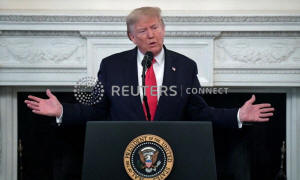White House calls for biggest NASA budget in decades to reach the moon,
Mars
 Send a link to a friend
Send a link to a friend
 [February 12, 2020]
WASHINGTON (Reuters) - The White
House on Monday asked Congress for $25.2 billion for NASA in 2021, the
agency's biggest budget in decades, calling for steady increases over
five years to meet President Donald Trump's goal of landing astronauts
on the moon and Mars. [February 12, 2020]
WASHINGTON (Reuters) - The White
House on Monday asked Congress for $25.2 billion for NASA in 2021, the
agency's biggest budget in decades, calling for steady increases over
five years to meet President Donald Trump's goal of landing astronauts
on the moon and Mars.
The request would boost the National Aeronautics and Space
Administration's budget by 12 percent for the fiscal year that starts
Oct. 1, with nearly half of the funds going toward the "Moon to Mars"
program, which includes development of lunar landers, robotic rovers,
heavy-lift rockets and new spacesuits.
"They are backing up our vision for a renewed era of discovery by giving
NASA ever-increasing budgets every year," NASA administrator Jim
Bridenstine said on Monday after the White House released its plan. "Now
we must deliver."

The Trump administration called on NASA early last year to reorganize
its exploration program to send humans to the moon by 2024 and to Mars
in the next decade, accelerating a previous timeline and increasing its
2020 budget by $1.6 billion.
The 2021 fiscal year budget, one of the largest overall spending
increases for NASA since the 1990s, doubles down on the "Moon to Mars"
project, which NASA projects will cost $71.1 billion over the next five
years, according to a blueprint sent to Congress on Monday.
[to top of second column]
|

President Donald Trump makes remarks during the White House Business
Session with the nation's governors in the State Dining Room of the
White House, Washington, DC, U.S., February 10, 2020. REUTERS/Mike
Theiler

NASA's budget is estimated to increase steadily over the next five
years to fund the program, peaking at $28.3 billion in fiscal year
2023, primarily going to privately developed lunar landing systems.
The budget includes $529 million for robotic trips to Mars,
including a mission to return soil samples back to Earth and map
near-surface water ice deposits that could inform future human
missions to the red planet.
Separately, the Trump administrationís $740.5 billion budget request
for national defense in 2021 allocates $15.4 billion for the U.S.
Space Force, which was established on Dec. 20 as an independent
service under the Air Force.
(Reporting by Joey Roulette; editing by Bill Tarrant and Sonya
Hepinstall)
[© 2020 Thomson Reuters. All rights
reserved.] Copyright 2020 Reuters. All rights reserved. This material may not be published,
broadcast, rewritten or redistributed.
Thompson Reuters is solely responsible for this content.
 |